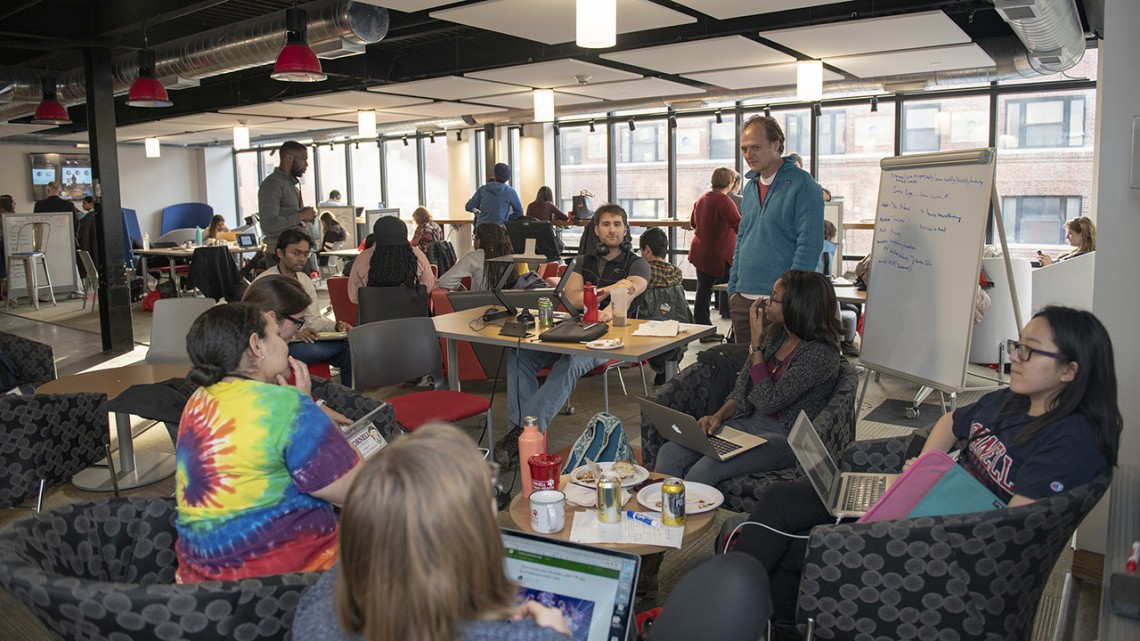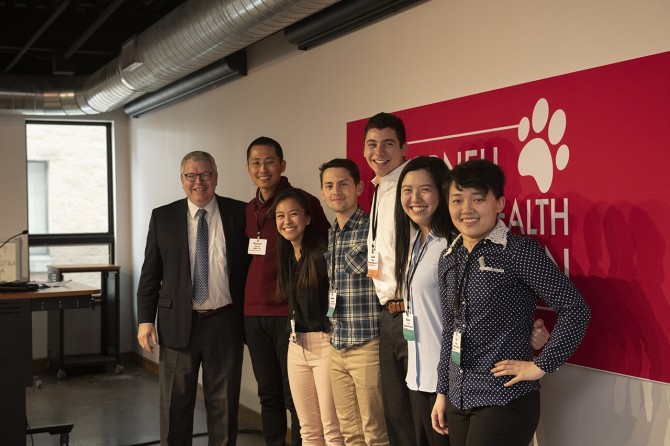
Student teams brainstorm ideas at the Cornell Animal Health Hackathon at eHub in Collegetown.
Hackathon looks to solve animal health issues
By Krishna Ramanujan
Following an oil spill, the race is on to save affected wildlife, especially birds. It takes three workers 45 minutes to clean each animal with soapy water, a method that hasn’t changed in the last 20 years.
A team of students has designed a new product that could save millions of birds and other wildlife. The Lean Preen Machine was unveiled at the 2019 Cornell Animal Health Hackathon, Jan. 27 at eHub in Collegetown.
In addition to soap and water, the team’s design incorporates a sonicator, an existing technology used by jewelers and dentists, which sends safe, high-frequency sound waves through the liquid. The waves agitate and remove oil particles from feather barbules in a fraction of the time soapy water and splashing can take. In addition, the design frees up one worker per cleaning unit to attend to other animals. That’s important as many birds die while waiting to get cleaned.
The Lean Preen Machine team walked away with two of four $2,000 prizes at the hackathon, winning Most Innovative Solution and the People’s Choice Award.
“From the judges’ perspective, we were really impressed that they were able to take an existing technology and very quickly convert it into something that could be used and that there is a huge unmet need for. And with the People’s Choice, the audience obviously agreed,” said Jodi Korich, DVM ’97, associate dean of education at Cornell’s College of Veterinary Medicine and one of six judges.
The hackathon was co-hosted by the College of Veterinary Medicine and Entrepreneurship at Cornell and offered a total of $8,000 in prize money. Approximately 125 students formed 17 teams to develop business solutions to a diverse set of issues in veterinary medicine. The teams – featuring students from nearly every college and school on campus, and some from other universities – developed their products in a blitzkrieg of activity over the weekend. Teams consulted with mentors, and IBM offered a workshop on design thinking. Products were judged on such criteria as relevance to veterinary medicine, scale of impact, novelty, commercial viability, financial feasibility, marketing potential and innovation.
“We saw a range of different products and solutions that really show the breadth of veterinary medicine,” Korich said.
The Lean Preen Machine team went through a few iterations – including employing a pedal-powered laundry machine and using gentle water jets, like in a hot tub – before settling on the sonicator, said team member MJ Sun, a fourth-year Cornell veterinary student.
“We spent a long time trying to make sure this product is safe for birds,” Sun said. “Their bones are hollow and are connected to other [delicate] parts of their body, so it would be traumatic if we damaged those crucial parts.”
Another team designed a system called Farm Speak, a subscription service to help farmers and non-English speaking laborers overcome language barriers to report on cow health at dairy farms. Farm Speak won for Best Market Ready Solution.
When migrant workers who interact daily with cows detect signs of disease, they can mark it on laminated sheets with diagrams and categories in their native language. These sheets are then photographed by a tablet in the barn, and an app automatically collates all the information for the farmer to download from a database.
“We wanted to come up with a solution that would help but at the same time be cost-effective,” said Inder Khanuja, a Cornell graduate student and a Farm Speak team member. According to the team, early detection to prevent mastitis on a dairy farm can increase milk production by 9 percent, and the service would cost a farmer about $100 per month.
The Stay on Track team – which proposed a simple, cheap and quick assessment for signs of orthopedic disease in racehorses – took the Best Vet Med Healthcare Solution award.
Judge Sarah Cutler Tew, senior manager for medical outreach at IDEXX, said entrepreneurship plays an important role in veterinary medicine.
“You can have really big problems with hard answers, but there are lots of times where for a smaller problem, you need a fresh set of eyes,” she said. “Big companies have great resources but tend to move slowly, so the entrepreneurship will really bring new technology and new approaches to solving problems.”
Media Contact
Get Cornell news delivered right to your inbox.
Subscribe

